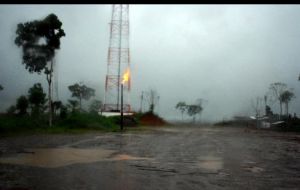MercoPress. South Atlantic News Agency
UN/Ecuador agree on trust fund to protect bio-diversity from oil industry
 Ecuador wants at least half of the 7 billion USD that developing oil would produce
Ecuador wants at least half of the 7 billion USD that developing oil would produce The United Nations Development Programme, UNDP, and Ecuador have reached agreement to set up a trust fund to protect an ecological site in an oil-rich area of the South American country’s Amazon region.
An estimated 846 million barrels of crude oil lying under the Yasuní National Park, which has been a World Biosphere Reserve since 1989, will be left alone under the deal that was signed this week in Quito, the Ecuadorian capital.
Yasuní, which is located in Ecuador’s Western Amazon region, covers 982,000 hectares in area and is considered one of the planet’s most bio-diverse sites.
UNDP estimates this accord will prevent the discharge into the atmosphere of more than 400 million tons of carbon that would have resulted from the burning of fossil fuels if the oil had been extracted at the Ishpingo-Tambococha-Tiputini (ITT) fields.
Ecuador will now seek contributions from governments to protect those fields from drilling and stressed that the initiative would not become a reality until the funds are collected.
The trust fund, which will be administered by UNDP, will have the objective of eventually holding at least half of the estimated 7 billion US dollars that tapping the oil would bring.
Rebeca Grynspan, UNDP Associate Administrator and a signatory to the agreement, said that “we are witnessing the inauguration of new instruments of cooperation which will act as a basis for supporting other national and international efforts directed towards the search for economies that are in harmony with society, nature and the planet.”
UNDP already administers more than 30 funds covering 74 countries through its Multi-Donor Trust Fund Office.
The signing of the trust accord took place at the Ecuadorian Foreign Ministry in the presence of Vice President Lenin Moreno and UNDP associate administrator Rebeca Grynspan as well as ambassadors and representatives of indigenous communities located in and around Yasuni National Park.
In a press briefing prior to the ceremony, Ecuador’s minister for national patrimony, Maria Fernanda Espinosa, said countries that contribute to the trust will receive Yasuni Guarantee Certificates, or CGYs, bearing Quito’s pledge the crude will remain underground for the indefinite future.
The CGYs, paying no interest and with no expiration date, are to reflect the amount of carbon-dioxide emissions that will be averted as a result of the respective contributions to what is known as the Yasuni-ITT initiative.
With the formal creation of the Yasuni-ITT trust, Ecuadorian officials will visit foreign capitals to solicit contributions. Espinosa is scheduled to leave for China to explain the initiative to officials in Beijing, while another member of Ecuador’s Yasuni-ITT negotiating committee, Ivonne Baki, visits to Germany, the Netherlands, Belgium, France, Norway, Spain, Italy and the United States are planned for next month.




Top Comments
Disclaimer & comment rulesCommenting for this story is now closed.
If you have a Facebook account, become a fan and comment on our Facebook Page!